New York, May 21st, 2021. The health crisis caused by COVID-19 represents a triple shock for children and adolescents: school closures, confinement, and loss of economic resources for their families, according to a report issued today by the UN Agencies UNICEF and UNDP: The invisible COVID-19 graveyard: intergenerational losses for the poorest young people and actions to address a human development pandemic.
The document exposes the pandemic unleashing significant negative impacts for children, especially for those in poorer households. The combination of reduced "teleworkability" of poorer parents, digital divide, the absence of in-person learning, cramped living conditions, domestic violence, and compromised physical and mental well-being, among others, adds to create the "inequality pandemic" that impairs the life chances of the youngest of the poor, and consequently, compromises the region's prospects for inclusive, sustained growth and development. According to ECLAC, more than 30 million people could fall into poverty in the absence of active policies to protect or substitute income flows to vulnerable groups.
Policy actions must support parents, promote gender parenting and provide financial support. Simultaneously, policy actions for children and youth to support formal learning are essential, with a focus on the delivery of an accessible and safe education and addressing the inevitable losses (past, present, and future) in curriculum content.
With each passing day, this “inequality pandemic” further jeopardizes the life chances of the youngest of the poor, and consequently, compromises the region’s prospects for inclusive, sustained growth and development. Concerted and intentional policy action is urgently needed. Central to effective policy interventions are two key elements: (i)leverage of existing programs and infrastructure, including cash transfer programmes, and (ii) community participation and ownership, especially programmes with an anchor community female leader.
The challenge issued to those with political and financial capital is to build the foundations for a thriving marketplace of healthy, educated, informed and skilled talent, unhindered by accident of birth, that can contribute to enterprise, innovation and economic advancement.
#.#.#
About UNICEF
UNICEF works in some of the world's toughest places, to reach the world's most disadvantaged children. Across more than 190 countries and territories, we work for every child, everywhere, to build a better world for everyone.
Follow UNICEF on Twitter and Facebook
About the United Nations Development Programme (UNDP)
UNDP is the leading United Nations organization fighting to end the injustice of poverty, inequality, and climate change. Working with our broad network of experts and partners in 170 countries, we help nations to build integrated, lasting solutions for people and planet
For further information, please contact:
Ana Maria Currea, UNDP +1 202 309-4981, ana.maria.currea@undp.org
Marisol Quintero, UNICEF +507 6569 2718, mquintero@unicef.org

 Locations
Locations

